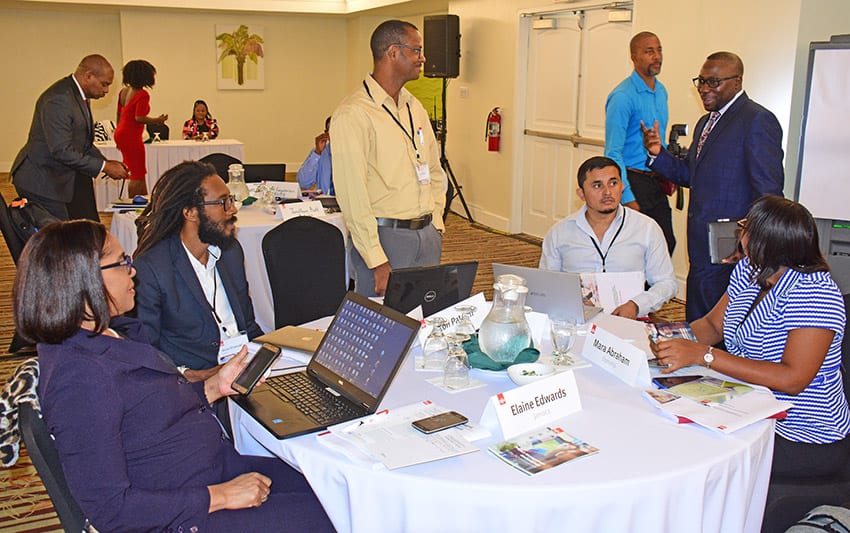
Minister of Small Business, Entrepreneurship and Commerce, Dwight Sutherland, speaking at the ISO Regional Workshop on Managing National Standards Development Projects and Programmes at the Radisson Aquatica yesterday. (GP)
Representatives of national standards bureaus (NSBs) across the region have been urged to seize opportunities to learn more about managing national standards development projects and programmes, as this would prove beneficial to country and self.
The appeal came on Tuesday from Minister of Small Business, Entrepreneurship and Commerce, Dwight Sutherland, as he addressed the International Organization for Standardization (ISO) Regional Workshop on Managing National Standards Development Projects and Programmes, at Radisson Aquatica, Aquatic Gap, St. Michael.
The four-day workshop, which ends on Friday, is a collaborative effort on the part of the Barbados National Standards Institution, CARICOM Regional Organization for Standards and Quality (CROSQ), the ISO and the Swedish International Development Cooperation Agency.
Minister Sutherland said: “I urge you all to be mindful that the ultimate goal of targeted capacity building programmes such as these is not only for participants to enhance their skills and knowledge-base, but to ensure that beneficiary developing countries, such as ours, can access international markets, boost competitiveness, contribute to the improvements of domestic business performance due to technical progress, and most importantly, recognize growth, sustainable economic development and social progress.”
These outcomes, he stressed, could only be achieved if a cohesive approach to standards development was embraced; if continuous engagement of stakeholder groups was undertaken; if the link between standardization and policy development was clear and endorsed, and if standards enforcement was supported fundamentally.
“These outcomes can only be achieved if the value of standards and quality is understood and appreciated by the business class across our region, since all these factors have a direct impact on our ability to trade globally,” Mr. Sutherland added.

Minister of Small Business, Entrepreneurship and Commerce, Dwight Sutherland, chatting with participants at the ISO Regional Workshop at the Radisson Aquatica yesterday. (GP)
Delegates were called upon to also understand more about the fundamental principles of good standardization practices and the associated linkages with standardization strategies and portfolio management.
Noting that the workshop would enhance participants’ understanding of the importance of applying project management approaches to the standards development process, he said: “I am also aware that this programme seeks to improve the NSB’s capacity to manage the work programme, and it further seeks to provide tools to implement project management practices and integrate them across all levels of the standards development process.”
Meanwhile, Technical Officer for standards at CROSQ, Fulgence St. Prix, noted that the programme was timely and relevant, as CROSQ’s standards development process was closely aligned with the ISO development process.
He said: “Since standards development is a major part of the quality infrastructure, therefore capacity building is essential to our members in managing increasing number of requests for standards by the private sector, public sector and generally the market.
“The implementation of developed and approved national standardization strategies is also another driving force for us to be able to have the capacity to manage standards programmes and projects nationally and regionally.”
Mr. St. Prix disclosed that CROSQ, as a sub-region was “the only region that had developed a Regional Standards Development Priority Plan”.
